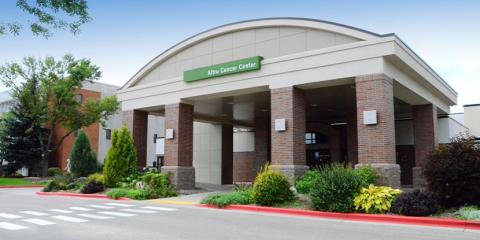Symptoms and Treatment Options for Colorectal Cancer
Colorectal cancer is the second-leading cause of cancer-related deaths for both men and women, and it’s one of the most common cancers in men. Screenings, early diagnoses and specialized treatment can help save lives.
At Altru Cancer Center, our staff is skilled at identifying symptoms and treatment options for colorectal cancer in men and women. Our providers and staff offer guidance, support and treatment for each patient’s individual needs. We also provide spiritual and emotional guidance through the difficult process of cancer treatment to help patients and families feel supported throughout their day-to-day lives.
Altru Cancer Center providers also have access to experts at the world-renowned Mayo Clinic through the Mayo Clinic Care Network, giving you access to advanced cancer treatments and, in some cases, eliminating the need for you to travel far from home for colorectal cancer treatment.
What is Colorectal Cancer?
Colorectal cancer occurs in part of the large intestine when tumors form in the intestinal lining. It is one of the most commonly diagnosed cancers in the United States for men and women.
Most types of colorectal cancer begin as polyps in the lining of the colon or rectum. Not all polyps are cancerous, but some types of polyps may become cancer.
Risk Factors of Colorectal Cancer
For both men and women, the risk of colorectal cancer increases with age. About 9 out of 10 cases of colorectal cancer occur in people over age 50, according to the Centers for Disease Control and Prevention (CDC).
Other risk factors include:
- Alcohol use
- Tobacco use
- Family history of colorectal cancer or colorectal polyps
- Inflammatory bowel disease, such as ulcerative colitis or Crohn’s disease
- Lack of physical activity
- Overweight or obesity
- Unhealthy diets, especially diets low in fiber, fruits and vegetables and/or high in fat and processed meats
- Some genetic disorders, such as familial adenomatous polyposis or hereditary non-polyposis colorectal cancer/Lynch syndrome
Colorectal Cancer Prevention
The most effective way to reduce your colorectal cancer risk is to exercise regularly, eat a healthy diet and have regular screenings. Colorectal cancer screenings can find polyps in the colon or rectum. Polyps can take as many as 15 years to develop into cancer, so screenings allow your provider to remove polyps before they become cancerous. Colorectal cancer screenings may also find colorectal cancer while it is at earlier, more treatable stages. Colonoscopies are the best option for colorectal cancer screenings.
Patients with an average risk of colorectal cancer should begin screenings at age 45. To schedule a screening colonoscopy, call 701.780.6533 or use MyChart.
Symptoms of Colorectal Cancer
Colorectal cancer symptoms in men and women may include:
- Blood in the stool
- Diarrhea or constipation
- Stomach pains or cramps that don’t get better
- Weight loss with no known cause
Sometimes, colorectal cancer does not appear with symptoms. That is one of the reasons why regular cancer screenings are vital.
Colorectal Cancer Types
The most common type of colorectal cancer is adenocarcinomas, which begin in the cells that make mucus. These are about 96% of all colorectal cancer cases, although there are other, rarer types of colorectal cancer, such as gastrointestinal carcinoid tumors, lymphomas or sarcomas.
Diagnosing Colorectal Cancer
If you have colorectal cancer symptoms or your provider finds something abnormal during your screening, your provider may perform a physical exam and ask you about your medical history.
He or she may also perform one or more of the following tests:
- Blood tests, which may look for liver enzymes, red blood cell counts or tumor markers that may be found in your blood
- Diagnostic colonoscopies, which are similar to screening colonoscopies but performed because your provider suspects colorectal cancer
- Imaging tests, such as ultrasounds, CT or MRI scans
- Biopsy, in which your provider removes a small tissue sample and uses it to diagnose cancer
Treatment for Colorectal Cancer
The treatment required for colorectal cancer will depend on the stage of cancer, but some common treatment methods include:
- Surgery to remove any polyps that weren’t removed during the colonoscopy or to remove a portion of the colon
- Chemotherapy, which uses drugs to kill cancer cells
- Immunotherapy, which uses a patient’s own immune system to fight the cancer
- Radiation therapy, which uses high-dose radiation to destroy cancer cells
- Targeted therapy, which stops the cell changes that cause colorectal cancer
Side effects and complications will differ depending on the type of treatment you require. Colorectal cancer is highly treatable when found early. Regular screenings can save your life.
Our oncology experts can help you navigate colorectal cancer screening, treatment and survivorship. Call 701.780.5400 to speak with a member of our team.












